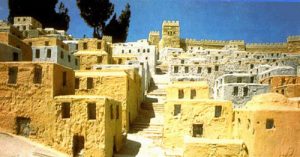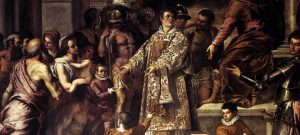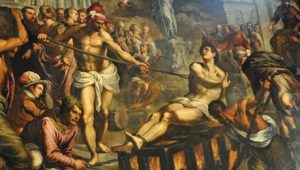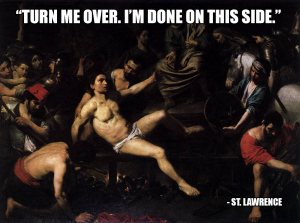
Pastor Rich Knight
Central Congregational Church
August 5, 2018
Sermon on the Mount Series
Matthew 6:19-24
“Do not store up for yourselves treasures on earth, where moth and rust consume and where thieves break in and steal; but store up for yourselves treasures in heaven, where neither moth nor rust consumes and where thieves do not break in and steal. For where your treasure is, there your heart will be also. “The eye is the lamp of the body. So, if your eye is healthy, your whole body will be full of light; but if your eye is unhealthy, your whole body will be full of darkness. If then the light in you is darkness, how great is the darkness! “No one can serve two masters; for a slave will either hate the one and love the other, or be devoted to the one and despise the other. You cannot serve God and wealth.”

“Store up for yourselves treasures in heaven,” said Jesus.
Several years ago I read of a survey done of Senior Citizens, where they asked this question: if you were starting your adult life over again, what would you do differently?
- A number of them said they might not have voted for Richard Украина #98312663 , nike running tank tops women cute , Nike air force 1 worldwide white/green женские кроссовки найк аир форс — цена 1700 грн в каталоге Кроссовки ✓ Купить женские вещи по доступной цене на Шафе Nixon so many times.
- Many said they would have purchased Apple stock when it sold for $1.00 a share!
Actually, their real answers were:
- They would have taken more risks.
- They would have worked a little less and spent more time with family & friends.
- They would have given themselves more to causes that would live on after them.
“Store up for yourselves treasures in heaven,” said Jesus.
Forest E. Witcraft put it so well in this famous quote:

“Store up for yourselves treasures in heaven,” said Jesus.
Give yourself, not to things that are temporary, but to things that are lasting.
There’s a story I once heard about “storing up treasures in heaven.”

A man died and went to heaven. He was met at the Pearly Gates by St. Peter who led him down the streets of gold. They passed stately homes and beautiful mansions, until they came to the end of the street where they stopped in front of a rundown cabin. The man asked St. Peter why he got basically a shack when there were so many mansions he could live in.
St. Peter replied, “Hey, I did the best I could with the money you sent us!”

“Store up for yourselves treasures in heaven,” said Jesus.
19“Do not store up for yourselves treasures on earth, where moth and rust consume and where thieves break in and steal; 20but store up for yourselves treasures in heaven, where neither moth nor rust consumes and where thieves do not break in and steal.
What do moths consume and destroy? Clothes.
In ancient times clothes were an important sign of wealth and status. (I guess it’s still that way – just look at the stylish Paul Manafort!) Only the wealthy had a lot of clothes.
And Jesus says, “You have to store those clothes somewhere, and moths can usually get to your clothes if they wish. So your wealth can be destroyed by a few hungry moths. So why give so much attention and energy to something so temporary and fleeting? Concentrate on things that will last.”
Another common threat to wealth in the ancient world were thieves. And if thieves wanted to get into your house back then they could do it rather easily. Because most homes were simply made of baked clay. So all a burglar would need was a good shovel. They could dig their way into a home very easily and take whatever material treasures they could find.

Jesus is saying,
“Wealth is not a lasting, reliable treasure in this world. Instead, focus on things that are lasting, that can’t be taken from you so quickly and easily. Material things are not the real treasures in life. The real treasures are invisible, intangible.”
“Store up for yourselves treasures in heaven.”
I was surprised to learn this week that the phrase, “treasures in heaven” was not original to Jesus. The ancient rabbis taught that a person’s deeds of kindness became that person’s treasures in heaven.
There was a story they told about a King Monobaz, who was a convert to Judaism. In a year of severe famine, King Monobaz gave away his treasures to the poor. His brothers sent him an angry letter scolding him for giving away his wealth, because it was the king’s job to enhance 104 – Air Jordan 4 Laser Black kaufen kannst – Jordan Legacy 312 Storm Blue – AQ4160 his wealth, not give it all away, they said.
Monobaz replied: The kings before us, “gathered treasures for below. I have gathered treasures for above.” They, “gathered treasures of money. I gathered treasures of souls,” of lives. They “gathered treasures in this world. I gathered treasures for the world to come.”
Jesus and the other ancient rabbis were certain that earthly treasures do not last, but deeds of kindness store up treasures and blessings for the world to come. What will those treasures be like in heaven? God only knows. But we do know that it’s worth spending our lives making deposits into that heavenly account.
It’s a story about an early church leader we now call, St. Lawrence.

Lawrence, an archdeacon in the church, and was martyred during the persecution of Valerian in 258 A.D. As archdeacon, St. Lawrence was in charge of all the church’s property and possessions. He was the chief financial officer to the Pope. But the emperor Valerian decided that the church was an illegal institution and that he was going to take all of the church’s property and kill all the clergy. The emperor’s officials didn’t want to kill Lawrence because they wanted to know where all the treasure and money was.
So Lawrence survived the persecution, and the authorities promised him freedom air jordan 2 cement grey if he would give them the treasures of the church. Lawrence said that he needed three days to gather and calculate the total worth of the treasures of the church to give to the emperor. During those 3 days Lawrence gave away all the church’s money and sold its possessions and gave all the proceeds and all the money to the poor.
After three days, it was time for Lawrence to turn over the church’s treasures to the authorities. Lawrence appeared before them in the town square, surrounded air jordan 23 howard university pe by a large crowd of people – the sick, the lame, the elderly, and the poor; the widows and orphans – all had been ministered to by the church. Lawrence held out his hands toward the crowd and said to the Roman officials:
“These are the treasures of the church.”

And for his audacity, he was martyred. But you know & I know that Lawrence was right.
The treasures of the church are the lives that we touch, the kindness that we show, the love that we share.
These are the treasures of the church.
These are the treasures of our lives.
“Store up for yourselves treasures in heaven.”
Amen.
St. Lawrence laughs in the face of death.
There’s another legendary story about St. Lawrence, regarding his martyrdom.
The Romans decided to burn him alive. They bound him to what became a large iron grill.

But Lawrence, full of faith & resistance to the end, spoke some of the most “famous last words” in the history of Christianity:

